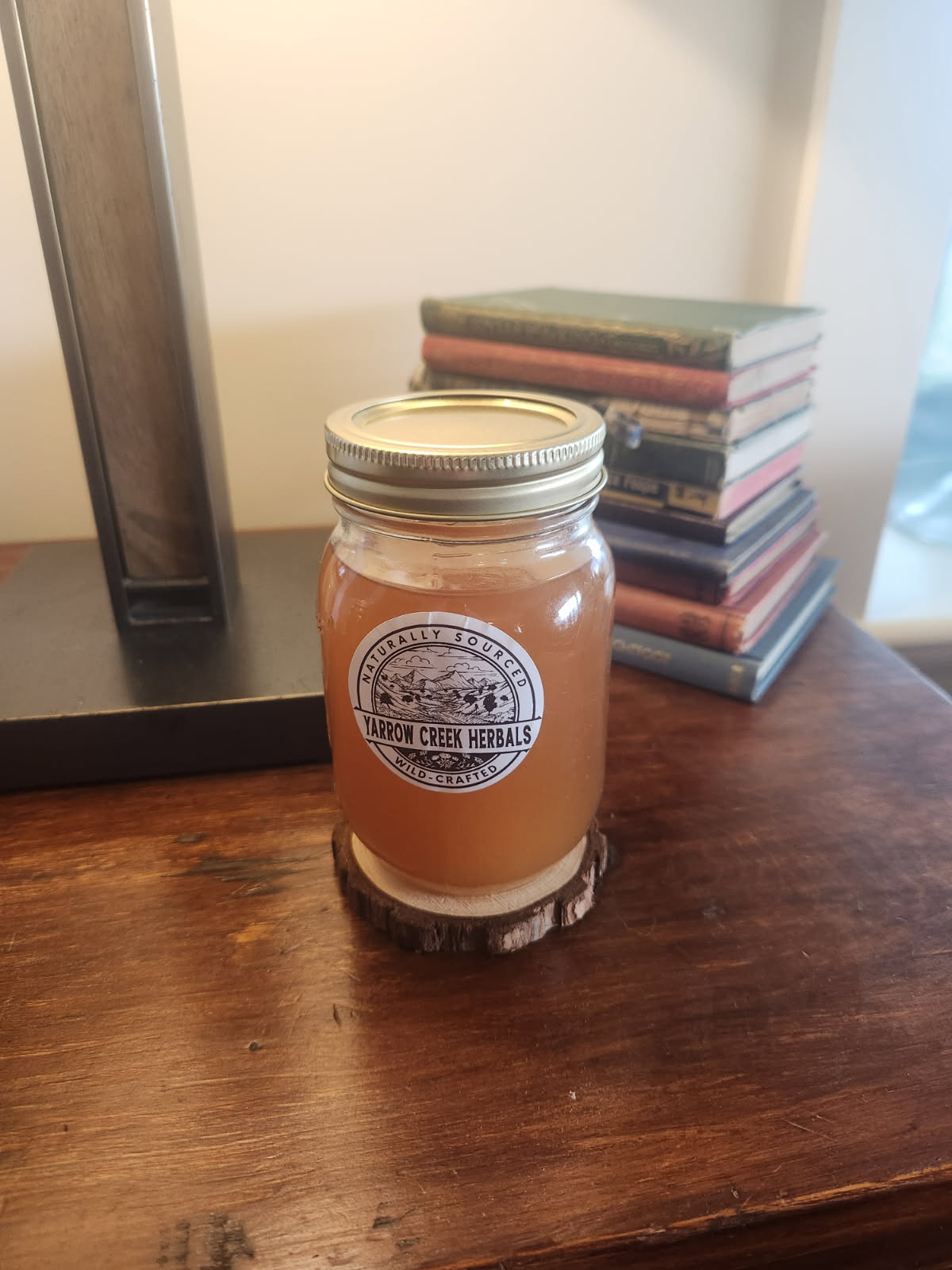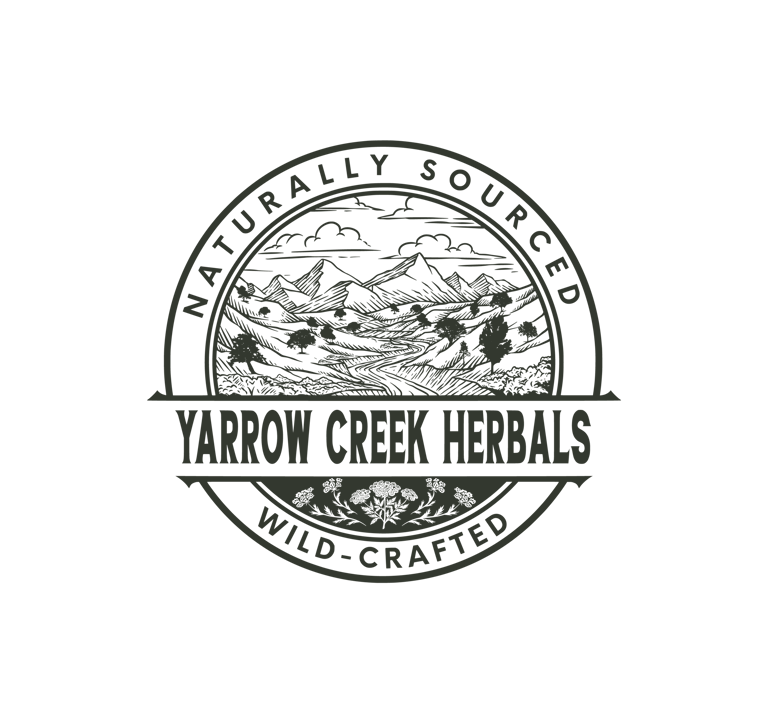
Fire Cider
Warming Immune Support & Daily Vitality Tonic
CA$25.00
Herbal Highlights & Research
Garlic (Allium sativum)
• Garlic’s sulfur compound allicin fights bacteria, fungi, and viruses. Research shows it can stop common pathogens and even Candida.
https://pubmed.ncbi.nlm.nih.gov/10594976/
• Traditional use: A go-to food and remedy against infections in both European and Asian traditions.
Ginger (Zingiber officinale)
• Compounds in ginger (gingerols and shogaols) calm inflammation and boost antioxidant defenses.
https://www.frontiersin.org/articles/10.3389/fphar.2022.818166/full
• Traditional use: A warming spice used to fire up digestion and keep the immune system strong.
Turmeric (Curcuma longa)
• Curcumin, the main active in turmeric, has powerful anti-inflammatory and antioxidant effects.
https://pubmed.ncbi.nlm.nih.gov/17569205/
• Traditional use: A “blood purifier” spice used for digestion, joint comfort, and overall vitality.
Horseradish (Armoracia rusticana)
• Strong plant chemicals called isothiocyanates (ITCs) fight bacteria and fungi like Staph and Candida.
https://pubmed.ncbi.nlm.nih.gov/24077540/
• Traditional use: Clears the sinuses and gets circulation moving.
Red Onion (Allium cepa)
• High in quercetin, an antioxidant that lowers inflammation and supports immune balance.
https://www.ncbi.nlm.nih.gov/pmc/articles/PMC7919894/
• Traditional use: Eaten through the winter to strengthen the blood and keep illness away.
Citrus (Lemon & Orange)
• Packed with vitamin C and flavonoids that protect cells and strengthen immune defense.
https://pubmed.ncbi.nlm.nih.gov/19263912/
• Traditional use: A bright winter remedy for resilience and energy.
Black Pepper (Piper nigrum)
• Piperine, the main active compound in black pepper, supports immune defenses by calming inflammation and stimulating immune cell activity. It also improves the absorption of key nutrients like curcumin from turmeric.
https://pubmed.ncbi.nlm.nih.gov/20210607/
• Traditional use: Taken to aid digestion and add warmth.
Rosemary (Rosmarinus officinalis / Salvia rosmarinus)
• Contains compounds like rosmarinic acid, carnosic acid, and essential oils that show antioxidant, anti-inflammatory, and antimicrobial properties, helping support immunity and protect against infection.
https://www.mdpi.com/2305-6320/5/3/98
• Traditional use: A circulatory stimulant and protective herb, often used during colder seasons to fortify the immune system.
Jalapeño (Capsicum annuum)
• Capsaicin, the compound that gives jalapeños their heat, shows antimicrobial effects in lab studies against bacteria and fungi, while also acting as a circulatory stimulant that brings warmth and helps open the sinuses.
https://www.frontiersin.org/articles/10.3389/fmicb.2015.01281/full
https://www.mdpi.com/2079-6382/11/9/1154
• Traditional use: Taken to clear congestion, warm the body, and stimulate circulation.
Cinnamon (Cinnamomum verum)
• Cinnamon’s main compound, cinnamaldehyde, shows strong antimicrobial effects against bacteria and fungi in lab studies, and has antioxidant activity that helps protect cells from oxidative stress.
https://pubmed.ncbi.nlm.nih.gov/39596788/
https://pubmed.ncbi.nlm.nih.gov/16710900/
• Traditional use: Added to tonics to warm the body and strengthen defenses.
Clove (Syzygium aromaticum)
• Rich in eugenol and other phenolic compounds; lab studies show clove has strong antioxidant activity (protecting cells from oxidative stress) and broad antimicrobial effects against bacteria, including antibiotic-resistant types.
https://pmc.ncbi.nlm.nih.gov/articles/PMC3819475/
https://bmccomplementmedtherapies.biomedcentral.com/articles/10.1186/s12906-023-04243-x
• Traditional use: Used for sore throats, toothaches, and as protection against infection.
Thyme (Thymus vulgaris)
• Thyme essential oil and its actives (like thymol and carvacrol) show antimicrobial, antioxidant, and anti-inflammatory properties in multiple lab and review studies, suggesting they help protect against respiratory and microbial threats. https://www.mdpi.com/1422-0067/24/8/6936
• Traditional use: Trusted for coughs, colds, and chest infections.
Oregano (Origanum vulgare)
• Oregano oil, rich in carvacrol and thymol, has broad antimicrobial and antiviral activity.
https://pubmed.ncbi.nlm.nih.gov/16218659/
• Traditional use: Taken for respiratory and digestive infections.
Apple Cider Vinegar
• Studies show vinegar balances blood sugar and improves mineral absorption, which supports energy and hydration.
https://pubmed.ncbi.nlm.nih.gov/9630389/
https://pubmed.ncbi.nlm.nih.gov/16015276/
• Traditional use: A daily digestive tonic and base for herbal extractions.
Raw Local Honey
• Clinical reviews show honey reduces cough frequency and severity in respiratory infections.
https://pmc.ncbi.nlm.nih.gov/articles/PMC6513626/
• Traditional use: Soothes sore throats, calms irritation, and preserves herbal blends.
Fire Cider has always been my ride-or-die winter tonic. A recipe I keep on hand, not because it’s trendy but because it works. This fiery vinegar blend wakes up the system: it gets the blood moving, clears the head, and gives your body the extra push it needs when the season tries to slow you down.
I start with the same foundation herbalists have relied on for generations: garlic, horseradish, ginger, onion, and hot peppers. Then I layer in rosemary from my own garden, bright citrus for antioxidant lift, and warming spices like cinnamon and clove. All of it is steeped in raw apple cider vinegar, which both extracts and preserves the medicine. The result? A sharp, tangy tonic that delivers circulation, digestion, and immune support in every spoonful.
Science backs what herbalists have always known. Garlic compounds fight germs, ginger and turmeric soothe inflammation, citrus and onion strengthen antioxidant defenses, and vinegar itself supports healthy blood sugar and digestion. When taken daily, Fire Cider helps keep the body resilient; at the first tickle of illness, it rallies your defenses fast.
It’s sharp, spicy, and not for the faint of heart — my dad always says it’s got “a kick on it like a mule” when I hand him his dose. But that’s exactly why it works so well: Fire Cider is meant to be strong. A spoonful delivers circulation, digestive fire, and immune support in one shot — a reliable ally for keeping the body steady through the toughest months of the year.
How to Use
• Immune defense (daily support): 1–2 tablespoons daily during cold/flu season.
• At first signs of illness: 2–3 tablespoons up to 3× daily.
• Digestive & circulation support: 1 tablespoon before meals.
• Culinary tonic: Use in dressings, marinades, soups, or as a flavorful vinegar base.
• For sensitivities: Stir in raw honey to soften the spice and make it more tolerable, especially for children or those new to pungent remedies.
Ingredients
Garlic (Allium sativum), Rosemary (Rosmarinus officinalis), Jalapeño (Capsicum annuum), Lemon (Citrus limon), Orange (Citrus sinensis), Red Onion (Allium cepa), Black Pepper (Piper nigrum), Cinnamon (Cinnamomum verum), Clove (Syzygium aromaticum), Thyme (Thymus vulgaris), Oregano (Origanum vulgare), Turmeric (Curcuma longa), Horseradish (Armoracia rusticana), Ginger (Zingiber officinale), Raw Apple Cider Vinegar.
Safety Note
Not recommended during pregnancy, for children, or for individuals with ulcers, reflux, or high digestive sensitivity. May interact with anticoagulant (blood-thinning) or hypoglycemic (blood sugar–lowering) medications. Always begin with small doses when new to spicy tonics.
See Disclaimer / Terms and Conditions for shelf life guidelines.
During Checkout
State = Province
